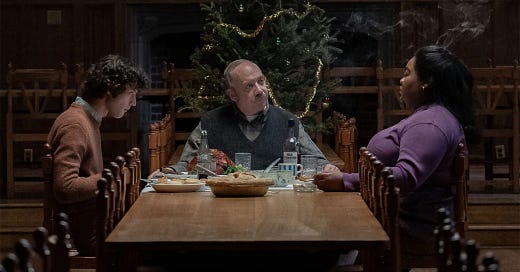“The Holdovers” is Picture-Perfect and Painfully Personal
A cozy Christmas film gives way to exploring grief and forgiveness
The Christmas movie, as a construct, is one that relies on the cultivation of a few closely-guarded emotions: nostalgia, joy, homesickness, comfort, love. But for all of us, the holidays carry far more emotions than the simple pleasures of the winter season that Christmas films portray. The Holdovers is the rare example of this genre that imbues comfort through a recognition of our frequent distance from it.
Set in the 1970s (complete with retro rating cards and logos for distributor Focus Features), The Holdovers depicts winter break at a New England boarding school with the students and staff who find themselves without a home for the holidays. The privileged students lament their holiday stay, seeing themselves as deserving of ski trips or island vacations. The senile, widely-hated teacher Paul Hunham (Paul Giamatti) who has been forced to supervise them is equally hostile to the situation, creating a regimented day-to-day schedule for the students to follow.
After a fractious start, the students’ already tenuous relationship with Hunham further declines, as he refuses to give several of them the grades they desire to appease their wealthy parents and ensure them spots at their desired prestigious universities. Eventually, most of the holdovers are granted an excuse to leave the grounds for the remainder of the holiday break, but one is forced to remain — a pompous student named Angus (Dominic Sessa), who harbors an inveterate dislike for Hunham.
Hunham and Angus are joined by Mary (Da’Vine Joy Randolph), the head of the school’s kitchen, who stays behind for the holidays after her son, a former student at the school, was recently killed in Vietnam. While their relationships begin on fractured grounds, Angus, trapped with two adults and with no family to return to, soon realizes he has a lot more in common with Hunham and Mary than he expects.
The Holdovers reflects the aesthetics and images of a bygone era, doing its best to dismiss the instincts of modern filmmaking in order to create a textured and human story etched in a different time. The grainy film stock and warm muted colors give the film a deceptively cozy veneer, not preparing the audience for the emotional turmoil each of the characters will undergo as they use this time of isolation to help each other through their respectively debilitating personal traumas.
The warmth that The Holdovers provides is embodied and enhanced by three stunning leading performances, from a familiar face like Giamatti to lesser known names like Randolph and Sessa, who makes his debut performance. While the performances and visuals are gripping, what prevents The Holdovers from never escaping the trappings of homage is its reliance on cliche. The film proves that it can do much more than beget well-worn and overly-pronounced allegories, but it inexplicably still relies on them. Hunham’s constant monologuing about the past informing the present gets cheap and wearisome once it becomes obvious that he is not only referring to the subject matter of his Ancient Civilizations class, but to the traumas of the characters and to the audience looking in on this time capsule of a film.
Despite these few unfortunate pitfalls, The Holdovers is far from cheap, and its kitschiness often comes across as endearing rather than annoying. It builds a semblance of comfort from an environment of solitude — a two hour embrace that feels like a home for those who don’t have one.
OVERALL SCORE: 8/10
The Holdovers was released on October 27 and is currently in US theaters and streaming on demand.





that's just the way it is. all right . . . go back to your, er, thing.